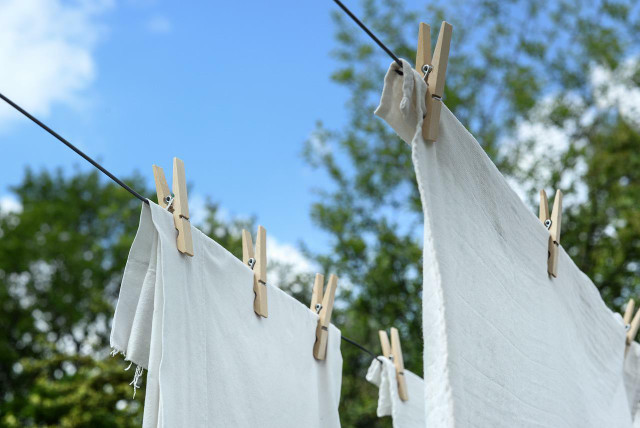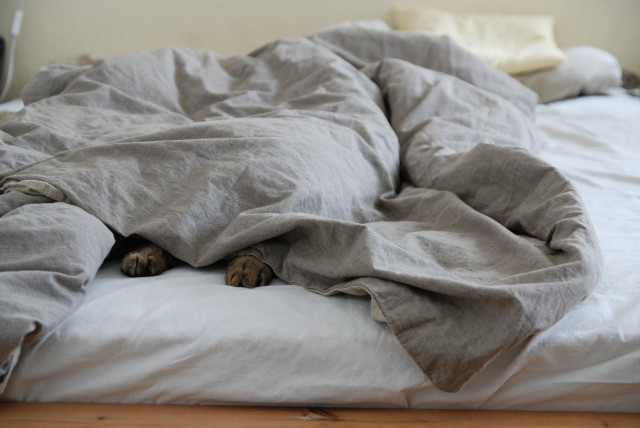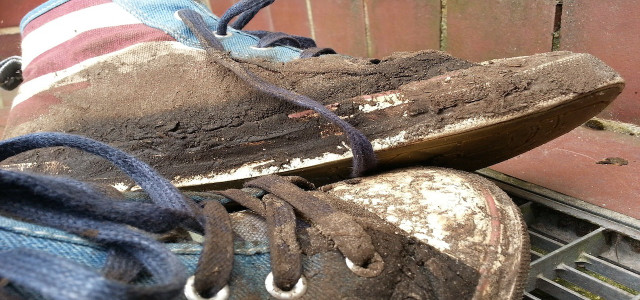Cleaning your duvet is a necessary hassle. Here are step-by-step instructions for how to wash a duvet in a sustainable and environmentally friendly way.
There is nothing more relaxing than getting into bed with freshly washed bedding. Most people know they should wash bed sheets regularly — at least every two weeks — but duvets are often neglected. Duvet covers collect sweat and skin cells while we sleep, building up with bacteria quickly over time. Furthermore, bed sheets can collect dirt from pets and spilled food and drinks.
If left unwashed, a duvet can collect up to 20,000 dust mites a year. Verity Mann, head of testing at Good Housekeeping Institute, advises that you should wash your duvet at least twice a year to keep it clean.
Tip: Duvets filled with feathers or down should always be washed at a laundromat to prevent shrinking.
How To Wash a Duvet

(Foto: CC0 / Pixabay / Skitterphoto)
- Use stain remover. You may have stains on your duvet that need extra attention. Look it over to find any stains and apply stain remover to the areas that need it — this gives those areas a deeper clean.
- Put it in the washing machine. If your washing machine is too small to fit a duvet, go to a laundromat to take advantage of their larger, commercial-sized washers.
- Add laundry detergent. Add the required amount of laundry detergent into the detergent dispenser.
- Select the appropriate cycle and run the washer. Set the washing machine cycle to a gentle, warm water wash. It is also a good idea to include an extra rinse and spin cycle to ensure no soap residue is left on the fabric.
- Transfer it to the dryer. Once the washing machine is finished, put your duvet in the dryer (if you have one). Set the dryer to a low or “air dry” setting. You can also lower your carbon footprint and reduce the energy you use by drying your laundry naturally. If the weather is warm enough, hang it to dry outside on a washing line or drape it over a drying rack inside.
- Wash the other bedding and make your bed. You may wish to wash additional bedding like your duvet cover and pillows. Once the duvet and other freshly washed bedding are dry, make your bed and relax!
Washing Your Duvet Sustainably



(Foto: CC0 / Pixabay / tvjoern)
There are a number of ways to ensure you are washing your duvet in as environmentally friendly a way as possible. The laundry detergent you use is one easy way to approach this. Using natural detergent or making your laundry detergent is more eco-friendly than buying store-bought cleaner. Commercial detergents are expensive and often contain harsh chemicals and toxins, including artificial fragrances. Some common ingredients used in scented laundry detergents are even classified as carcinogens by the US Environmental Protection Agency. Homemade detergent also reduces the amount of plastic that you use.
Another way to be environmentally conscious is to buy a natural duvet rather than one made from synthetic material. Synthetic duvets are made from materials like polyester or silicone. These synthetic fibers shed microplastics into the ocean, mainly through laundry wastewater. The WWF estimates that microplastics kill 100,000 marine mammals every year. Doing a spot clean is another way to conserve energy if you do not need to wash your whole duvet.
How To Spot Clean



(Foto: CC0 / Pixabay / Donskussen)
If your duvet only has small stains and you think it doesn’t need to be washed entirely, you can do a spot clean. According to the National Park Service, household washing machines use 41 gallons of water per load — this is a lot of water, making spot cleaning a more sustainable way to remove small stains. All you need is a clean rag, stain remover and a spray bottle of water.
- Identify the stain you wish to treat.
- Spray the stain with water.
- Apply stain remover to the area.
- Gentle rub the stain with the clean rag.
- Leave the stain remover to soak for 20 minutes.
- Once the stain has come out, apply more water to remove any remaining soap suds and residue.
- Dry the area by hanging the duvet outside to dry if the weather is warm, inside if not, or dry the spot quickly using a blow-dryer.
Read more:
- Washing Clothes with Vinegar: Benefits of Adding Vinegar to Laundry
- How to Wash White Clothes: Preventing Discoloration
- Citric Acid for Cleaning: Practical Household Uses
Do you like this post?







